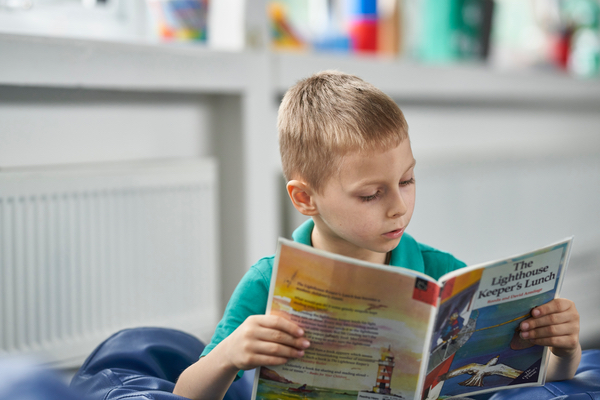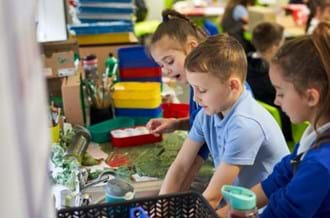The case for early intervention
Place2Be Chief Executive Catherine Roche explains why we should prioritise early intervention when it comes to children's mental health.

Last week I participated in a debate at the Royal Society of Medicine entitled “This house believes early intervention for children’s mental health should be prioritised over later intervention.”
We all know that in the ideal world, it’s not an ‘either - or’, an ‘upstream vs downstream’ - we need both. But the challenge is that right now there is an imbalance and I believe that we need to favour and prioritise early intervention in order to shift the dial and make the case to deliver the change needed.
Why early intervention is needed
In recent years we’ve seen a definite change in attitudes. We've moved from a world of stigma, closed doors, darkness, never daring to utter the word ‘mental’ to one where there is greater recognition and public interest and openness to understanding our emotional needs and wellbeing. We are beginning to shine a spotlight and the facts are beginning to gather traction as to why early intervention is important and how it can prevent greater mental health difficulties, distress, illness, personal cost and public expenditure in later years:
- Around one in eight 5 to 19-year-olds experience a mental health disorder (1)
There is evidence that this is increasing compared with 13 years ago when one in ten had a mental health disorder (2) - These early mental health difficulties can lead to having mental health difficulties in adulthood - half the people who experience mental health difficulties in adulthood, experienced them for the first time as children, before the age of 14 (3)
- There is evidence that mental health difficulties persist, and this is more the case with conduct disorders (4)
- Children with conduct disorders are more likely to experience adult mental health problems and reduced life chances - leaving school with no qualifications, being at higher risk of becoming drug-dependent, more likely to end up in prison, and more likely to die before the age of 30 (5)
- Improving children and young people’s mental health is associated with reduced levels of truancy, school exclusions, crime and smoking, and increased probability of employment and a higher wage. (6)
Early intervention works
There is a growing evidence base to show that intervening in the early years of a child's life can make a significant difference. Place2Be is a pioneer in promoting early intervention in children and young people’s mental health. Evidence from our work with c5,000 children in UK schools for whom we provide targeted support each year shows that we can help change the trajectory of those where mental health problems are identified early: (7)
- Two in three children who are referred to Place2Be’s service have improved mental health at the end
- Of the children who have severe difficulties at the start, half recover clinically - and this improvement is typically sustained one year later
- In other words, 82% of children who had no or moderate mental health difficulties at the end of their intervention still had no or moderate difficulties one year later
- And when we think about what this means for a child in school every day and the impact on their learning – we’ve asked teachers and they say that 69% of children are less of problem for their teachers or peers in the classroom and 64% have improved attitudes to learning
- Then we think about who that child is outside of the classroom and we find that 76% of parents report improvements in home life and 77% of the children themselves report improvements in their friendships – and we know how important friendships and the capacity to make connections and build positive relationships are in life
Improving children and young people’s mental health before they reach adulthood not only makes the immediate difference at the time, it also has potential to improve life chances and lead to cost savings to individuals and society. Research by Pro Bono Economics on Place2Be’s work found that for every £1 that intervening early costs, there is a saving to individuals and society of £6.20. (8)
Transforming lives
Importantly, intervening early also makes a qualitative difference to the lives of individuals. Adults who recall their experience of counselling with Place2Be when they were children report improved self-awareness and emotional regulation which had a positive impact on their relationships as they progressed through life. (9)
One of our young ambassadors Matthew, tells his own story and experience of the impact of Place2Be’s early intervention in his school.
My hope for the future
Place2Be's work is embedded in schools at the heart of local communities, providing a whole school approach and working with children, school staff, class teachers, parents and specialist services. But my hope for the future is that early intervention becomes the norm, as part of every child's healthy development. So let’s dial up and focus on mental health in every aspect of a child’s life and every child needing and having good mental health to flourish.
Let’s think about what we would like our children in five, 10, 15 years to experience, how we can lay the foundations to help our children to grow up as active citizens, purposeful for the future. Let's move away from the focus on ‘more funds are necessary for mental health services within the NHS'. We want our children to thrive in a school system that supports ‘the whole child’ - class teachers, parents, peers who all understand the role that we can all play in the continuum of care and need.
We also need greater understanding and differentiation in language. Mental health is different from mental health problems or mental illness. Let’s look at this in the same way as we did smoking or obesity and think about public mental health. Once again, this is not an ‘either - or’ situation - it's crucial to treat mental health problems and mental illness. But we also need to recognise that we all have mental health and in order to do that, we have to prioritise early intervention to nurture the emotional wellbeing of the next generation.
References
Sadler, K., Vizard, T., Ford, T., Marcheselli, F., Pearce, N., Mandalia, D., Davis, J., Brodie, E., Forbes, N., Goodman, A., Goodman, R., & McManus, S. (2018). Mental health of children and young people in England.
Sadler et al. (2018) op cit. ; Green, H., McGinnity, Á., Meltzer, H., Ford, T., & Goodman, R. (2005). Mental health of children and young people in Great Britain, 2004.
Jones, P.B. (2013). Adult mental health disorders and their age at onset. The British Journal of Psychiatry, 202(s54), s5-s10; Kim-Cohen, J., Caspi, A., Moffitt, T.E., Harrington, H., Milne, B.J. and Poulton, R. (2003). Prior juvenile diagnoses in adults with mental disorder: developmental follow-back of a prospective-longitudinal cohort. Archives of General Psychiatry, Jul;60(7):709-17; World Health Organisation (2018). [Website content]. (Retrieved 8th April 2019).
Goodman, R., Ford, T. and Meltzer M. (2002). Mental health problems of children in the community:18 month follow up. British Medical Journal;324:1496–7
Moffitt (2006), Life-course-persistent versus adolescence-limited antisocial behaviour: a 10-year research review and a research agenda. In: Cicchetti, & Cohen [Eds.]. Risk, Disorder, and Adaptation, Developmental Psychopathology, 3, 720-98. Hoboken, NJ: John Wiley.
Paull and Xu (2017), Study of Early Education and Development (SEED): The potential value for money of early education, Department for Education Research report, Frontier Economics, July.
Place2Be (2018). Outcomes 2017/18. Unpublished internal report.
Pro Bono Economics (2018). Economic Evaluation of Place2Be’s Counselling Service in Primary Schools.
Lansdell, B. (2017). How Do Clients View the Long-Term Impact of School Counselling? Unpublished Masters Thesis.
News & blogs

Uniting health and schools to improve mental health
Read Place2Be Chief Executive, Catherine Roche's, thoughts on uniting health and schools to improve mental health.
Read more
Bukhman Philanthropies Partners with Place2Be to Support Children and Young People’s Mental Health
Read about Bukhman Philanthropies' partnership with Place2Be to support Children and Young People’s Mental Health
Read more
Royal Foundation Centre for Early Childhood Funds Innovative Mental Health Pilot
The Royal Foundation Centre for Early Childhood is funding an innovative new pilot with Barnardo’s and Place2Be.
Read more



